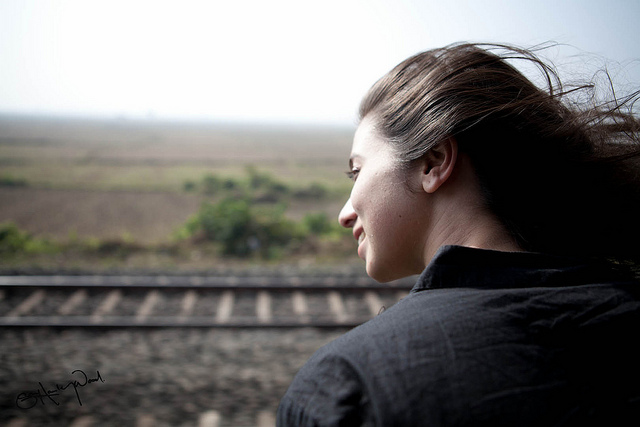I’m on a journey, but then honestly, who isn’t? My solo journey this time is for three months around a smattering of Asia’s jewels—India, Indonesia and Laos to name a few.
Apart from seeing and experiencing these beautiful places, my goal is to grow as a person, gain experience and insights and broaden my mind. I’ll also travel as sustainably as possible, and I aim to have as positive an impact on the places I travel with as low a footprint as possible, while supporting locally owned businesses and generating as little waste as possible. I will choose trains over planes where possible, choose eco-lodges over foreign-owned hotels and say no to bottled water where I can.
But thinking about sustainable travel on my journey, I’m bugged by a repeating thought: if we really want to be sustainable, wouldn’t it be better if we all just stayed home? Think of the millions of tons of CO2 we’d save the atmosphere from.
Some of our travel habits aren’t so sustainable, either. Wherever we travel, there’s a guidebook, a forum, a recommended itinerary and tour desks all touting the same routes. It seems that all but the intrepid hit the same hot spots, ignore the unknown, recommend the same places and snap the same “must take” photos. We’re all after the same experience.
Yes, it seems the benefits of travel (economic, social, or otherwise) are subject to the Pareto principle. With 80% of us visiting the same places, the benefit to the host country, particularly if it is a developing country, ends up being confined to areas where the 80% travel to. And so we have to review if it’s actually much of a benefit.
The increase in global tourism has caused some questionable things: dead coral reefs, the overdevelopment of land for hotels, the eviction of local people from their homes in order to make space for luxury resorts… And the list goes on.
But for most of us, stopping travel is unthinkable. It’s not an option. And surely, the good impact outweighs the bad. Right? So why travel? What keeps us in this and why does it really matter besides getting our spot on a white sand beach?
For me, travel is a metaphor for spiritual and self growth, and it holds some of life’s important lessons:
To travel is to experience impermanence
I recently learned the difference between knowing something and experiencing something. We may know what is good or true, but experiencing it is what really makes us change our habits.
One of the joys of being a solo traveler is meeting people along the way—people you wouldn’t meet if you were traveling with a partner, a family or a friend. There’s something about traveling alone that opens us up to others. Sometimes great connections are formed: we travel for days with people we’ve just met. Other times, it’s a fleeting hello in a café or a chat on the beach.
And then there are the people from the countries we visit. We’re taught to be cautious—scared even—of interactions with “locals.” We’re constantly told to look out for scammers, particularly in the developing world. Yet the experiences that I’ll treasure most from my first few weeks away are those where strangers looked after me as a solo female traveler and demonstrated such compassion and kindness that it touched my heart.
The fleeting moments are what touch us and give us heart to move onwards
With travel, we define our existence by the hour and the number of nights we stay in a place, not by the years that we give ourselves in our lives overall. We know, accept and welcome that everything is fleeting and will be over all too quickly. After all, our journeys—in life at “home” and while traveling—are nothing but a series of moments, and when we travel, we really witness this for ourselves.
We need very little to be happy
One of my vices is that I’m an overpacker. As a natural control freak, I spend the days before a big trip wondering what I’ve forgotten. As soon as I arrive, I realize I’ve bought too much stuff, half of which I don’t need, and I end up giving things away or sending stuff home piece by piece.
I read somewhere: the less you pack, the better time you’ll have. I couldn’t agree more (well, maybe two pairs of underwear are better than one), but it serves as a reminder that we in the developed world have so much stuff—stuff that doesn’t serve a purpose and just takes up space and holds old energy.
If I can manage three months with just a backpack, it’s curtains for most of my wardrobe when I’m back.
We are reminded to be in the present moment every moment
There’s something about being in a new place. Our eyes, our ears and our noses are open. We soak up the atmosphere with relish. We feel the place. On the other hand, I’m not sure when I last noticed the smell of my hometown. Constantly moving, we’re forced to be aware of our surroundings and live that reality. Somehow it seems much easier to be in the moment.
It pays to go off the beaten track
It’s easy to follow the crowds and I’m guilty of it often. I’m just carried on a wave. But the places I’ve been to that I hold closest to my heart are often those that I came upon accidentally or were completely unknown entities until someone showed their favorite places to me.
That feeling of rounding the corner and your jaw dropping. Seeing something you never expected and so had no expectations for
Off the beaten track, people seem happy to see us tourists. There are no crowds. There’s no hassle. People are curious and seem happy to see us. It’s a clear win-win, as our spending benefits those who don’t get 80% of the tourist dollars. And we might just get an amazing moment and a memory that we’ll cherish.
Just like in the rest of life, where do we really get if we follow the herd? It feels safer for sure. But linking back to impermanence—when are we really ever “safe”? Everything can change at any moment. It seems that life is calling us to step off the beaten path.
These are some of the lessons I’ve been lucky enough to experience.
And as for traveling—I’ll continue to travel, but I’ll try to do so mindfully. While it’s not easy, I’ll try to ensure that my travels have a positive impact on both myself and others. And when in doubt, I’ll stop and think about the possible consequences of my decisions.
Author: Ellie Cleary
Editor: Evan Yerburgh
Image : Flickr











Read 2 comments and reply